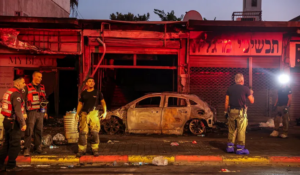For Arabs in Israel it’s bloodshed and despair with no end in sight

The aftermath of a deadly car bombing in Ramle in September 2024
Deiaa Haj Yahia writes in Haaretz on 16 September 2024:
Murder scenes are becoming a routine sight, and headlines report new victims every week. Automatic gunfire and explosive devices are now part of daily life in Arab communities. The pain is suffocating residents who are no longer able to express their fears. In the past, people talked, shared, protested. Now, silence reigns.
The fear doesn’t stem only from the crimes committed, but from a sense that the situation will only deteriorate. The normalization of violence is no less dangerous than the crimes themselves, and could lead to a mentality of total helplessness.
More than 170 people have been murdered in Arab communities since the beginning of this year, including women and children. Crime organizations dominate the streets and their cruelty is worsening.
The police aren’t managing to prosecute even 10 percent of the murderers, in contrast to over 80 percent in Jewish communities. Law enforcement is absent and the current government only exacerbates the crisis. Residents, left on their own, feel they have to combat not only crime, but their fear, despair and abandonment by the government.
Along with tension over the fighting on Israel’s borders, the rampant crime tells people that their dream of living in security is becoming impossible. According to a research institute at the Ruppin Academic Center, the number of Arab citizens considering emigration has doubled since October 7, from 7 percent to 14 percent.
This increase happened on the watch of the minister responsible for citizens’ security, Itamar Ben-Gvir, but he continues to blame everyone except himself. In the past, when fear was only beginning to appear and despair wasn’t as deep as it is now (until six years ago), people took to the streets in large numbers, blocking roads, marching, waving banners, demonstrating on every corner, fighting for change and demanding equal rights and security. Now, many have stopped going to demonstrations out of deep cynicism over the prospect of change.
Why should we go out and risk our lives when in the end we’ll remain with the same helplessness? Why demonstrate when the police will continue to oppress us, people say.
Even when they want to raise their voices, they find themselves facing policemen armed with stun grenades, tear gas and batons, ready to strike and silence and quash the right to security, a right the police are supposed to protect. Here too, it’s apparent that a strong arm is not used to eradicate crime but to deter anyone trying to change the situation.
The police bear clear and absolute responsibility for the situation. The burden of proof lies with them, and the numbers only attest to their failure. But blaming only the police is an avoidance of facing the complex reality.
Dealing with the problem of crime and organized crime gangs in Arab communities should be a major government initiative, requiring not only the intervention of the police and other security forces, but the involvement of education, welfare, construction and housing, as well as the involvement of Arab society. The war against crime begins with deterring criminals, with investment in education, in welfare and with attention to youths who are now invisible.
Along with frustration over the government and police, the disappointment also stems from the lack of involvement of Arab politicians.
Public representatives aren’t succeeding in spearheading a campaign. They can’t bring people out to the streets and are not coming out with resolve against crime, with only a few of them talking about the need for a thorough and profound change. Thus, the Arab public remains between a rock and a hard place, between a government that is uninterested in Arab blood and a failing police force on one hand, and crime organizations that are now taking up decapitation, on the other.
This article is reproduced in its entirety
